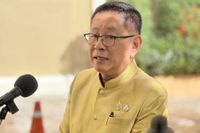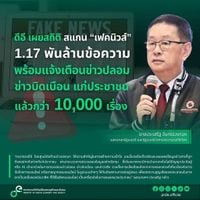In an effort to combat the widespread issue of fake news, particularly concerning online crime, the Ministry of Digital Economy and Society (DE) of Thailand is ramping up its initiatives to protect the public. On April 7, 2025, Mr. Prasert Chanthararuangthong, the Minister of DE, announced that the ministry has been actively working to address and prevent the harmful impacts of misinformation.
Since its establishment, the Anti-Fake News Center (AFNC) has reviewed a staggering 1,172,694,555 messages, with 74,892 requiring verification as of March 31, 2025. This extensive operation reflects the ministry's commitment to ensuring the public is promptly informed about the truth, especially regarding issues that could lead to online victimization.
According to Mr. Prasert, the ministry recognizes the urgency of providing accurate information to the public before they fall prey to online scams. The AFNC has collaborated with over 400 agencies from various sectors, including government bodies, the private sector, and civil society, to create a robust network for verifying news.
Among the 38,361 items sent for verification, the categories of concern included disaster news (18,168 items, 47.36%), health news (14,082 items, 36.71%), economic news (2,115 items, 5.51%), online crime news (2,171 items, 5.66%), and policy news (1,825 items, 4.76%). This categorization highlights the diverse areas where misinformation can have serious consequences for the public.
Of the total items verified, 19,954 were confirmed, revealing a concerning trend: 6,987 items (35.01%) were identified as fake news, while 7,955 (39.87%) were true, and 2,241 (11.23%) were misleading. Additionally, 2,771 items (13.89%) were classified as having insufficient information.
In a proactive move, the ministry has disclosed 10,293 verified items to the public. This included 7,230 items of fake news (70.25%), 2,266 true news items (22.01%), and 797 misleading items (7.74%). Such transparency is crucial in building public trust and ensuring that citizens are well-informed.
Mr. Prasert emphasized the importance of timely communication, stating, "The DE, through the AFNC, is dedicated to creating awareness and providing accurate information, as well as disclosing fake news that needs attention to the public." This statement underscores the ministry's goal to mitigate the risks associated with online misinformation.
Looking ahead, the DE plans to integrate artificial intelligence (AI) technology into its verification processes. This initiative aims to enhance the speed and accuracy of identifying fake news, misleading information, and true news. The use of AI is expected to significantly bolster the ministry's efforts to combat online fraud and other forms of cybercrime.
Mr. Prasert noted that the introduction of AI will allow for more efficient monitoring and alerts regarding various online scams. He stated, "We aim to reduce the losses of the public falling victim to fraudsters who use social media as a tool to deceive people." This proactive approach is designed to keep pace with the rapidly changing digital landscape.
The ministry's ongoing efforts reflect a growing recognition of the serious implications of fake news in today's society. With the rise of social media and online platforms, misinformation can spread rapidly, causing harm to individuals and communities alike. The DE's initiatives are a crucial step in addressing this challenge.
As the situation continues to evolve, the DE remains committed to maintaining public confidence in the information disseminated online. The integration of AI is just one of many strategies being employed to ensure that the public can trust the news they receive.
In summary, the Ministry of Digital Economy and Society is taking significant steps to combat fake news, particularly those related to online crime, by utilizing a comprehensive verification process and planning to implement AI technology in the near future. This commitment aims to protect the public from misinformation and enhance the overall quality of information available to citizens.






